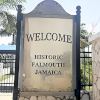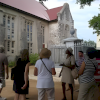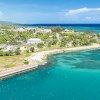In the fifteenth century, when European explorers embarked on their voyages of discovery. Falmouth was originally inhabited by indigenous Taino people. However, it was not until the arrival of Christopher Columbus in 1494 that Jamaica adopted ways that was native to the Spanish. The Spanish established settlements across the island, but their presence in the Trelawny region was relatively limited.
Fast forward to the seventeenth century, when the British Empire sought to expand its colonial reach. In 1655, under the leadership of Admiral Sir William Penn and General Robert Venables, the English captured Jamaica from the Spanish. Following the British conquest, the island experienced a period of rapid development and became a hub of economic activity.
It was during this time that Falmouth began to take shape. In 1769, Edward Barrett, a prominent planter, recognized the potential of the region and founded Falmouth as a thriving sugar port. The town was named after his birthplace in Cornwall, England, and soon emerged as one of the most prosperous and cosmopolitan areas in Jamaica.
The Golden Era: Falmouth's Prosperity
Falmouth's prosperity reached its peak during the eighteenth and nineteenth centuries. The town quickly became a vital center for the sugar trade, attracting wealthy planters, merchants, and investors from across the globe. With its deep natural harbor, Falmouth became a bustling port and a significant hub for the export of sugar, rum, and other commodities.
The wealth generated by the sugar industry led to the construction of grand Georgian-style mansions, elegant public buildings, and charming churches that still grace Falmouth's streets today. The town's architecture showcases a unique blend of European, Caribbean, and Georgian influences, reflecting its rich heritage.
While Falmouth flourished economically, it is essential to acknowledge the dark chapter of its history: the transatlantic slave trade. Like many other ports in the Caribbean, Falmouth played a significant role in this abhorrent practice. Enslaved Africans were brought to the island and sold at the Falmouth Court House, which served as a slave market.







1 comments for this post
lPZKdhylXXHzROJTWVkzp
HVxqznTTHrUvLbNYM